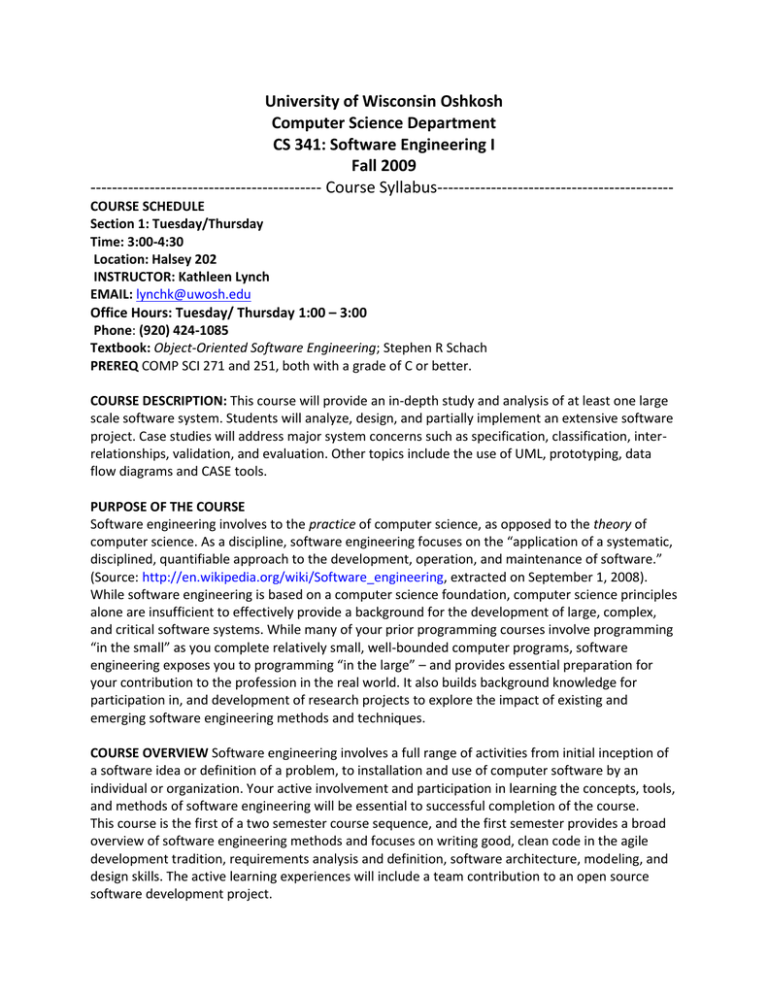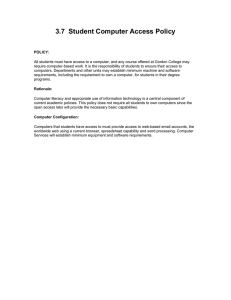University of Wisconsin Oshkosh Computer Science Department CS 341: Software Engineering I
advertisement

University of Wisconsin Oshkosh Computer Science Department CS 341: Software Engineering I Fall 2009 ------------------------------------------- Course Syllabus-------------------------------------------COURSE SCHEDULE Section 1: Tuesday/Thursday Time: 3:00-4:30 Location: Halsey 202 INSTRUCTOR: Kathleen Lynch EMAIL: lynchk@uwosh.edu Office Hours: Tuesday/ Thursday 1:00 – 3:00 Phone: (920) 424-1085 Textbook: Object-Oriented Software Engineering; Stephen R Schach PREREQ COMP SCI 271 and 251, both with a grade of C or better. COURSE DESCRIPTION: This course will provide an in-depth study and analysis of at least one large scale software system. Students will analyze, design, and partially implement an extensive software project. Case studies will address major system concerns such as specification, classification, interrelationships, validation, and evaluation. Other topics include the use of UML, prototyping, data flow diagrams and CASE tools. PURPOSE OF THE COURSE Software engineering involves to the practice of computer science, as opposed to the theory of computer science. As a discipline, software engineering focuses on the “application of a systematic, disciplined, quantifiable approach to the development, operation, and maintenance of software.” (Source: http://en.wikipedia.org/wiki/Software_engineering, extracted on September 1, 2008). While software engineering is based on a computer science foundation, computer science principles alone are insufficient to effectively provide a background for the development of large, complex, and critical software systems. While many of your prior programming courses involve programming “in the small” as you complete relatively small, well-bounded computer programs, software engineering exposes you to programming “in the large” – and provides essential preparation for your contribution to the profession in the real world. It also builds background knowledge for participation in, and development of research projects to explore the impact of existing and emerging software engineering methods and techniques. COURSE OVERVIEW Software engineering involves a full range of activities from initial inception of a software idea or definition of a problem, to installation and use of computer software by an individual or organization. Your active involvement and participation in learning the concepts, tools, and methods of software engineering will be essential to successful completion of the course. This course is the first of a two semester course sequence, and the first semester provides a broad overview of software engineering methods and focuses on writing good, clean code in the agile development tradition, requirements analysis and definition, software architecture, modeling, and design skills. The active learning experiences will include a team contribution to an open source software development project. The education and background needed by a software engineer extend well beyond strong technical skills and frequently include: strong interpersonal skills, good oral and written communication techniques, ability to contribute to a team effort, adaptability, project management skills, understanding of business principles and strategies, and the ability to see a problem from the perspective of a user/client rather than from a programmer’s perspective. Please note that the development of these skills is more challenging than simply acquiring knowledge of specialized vocabulary and facts that are easily memorized from a book, power point slides, or a lecture. Analysis, problem-solving, communication, team work, and project management are critical activities in which you must actively engage. LEARNING OUTCOMES Learning outcomes represent the knowledge, skills and abilities, and attitudes/behaviors you will acquire as a result of successful participation in this course. The learning objectives for Software Engineering are listed below. Please note that each learner’s progress will be assessed at regular intervals using a variety of different assessment tools both written and observed; in addition, learners will have the opportunity to self-assess their progress in some areas. 1. Describe the concepts and principles that guide software engineering practice. 2. Define the requirements engineering process and associated activities for both computerbased and web-based systems. 3. Define the analysis modeling process and associated activities for both computer-based and web-based systems. 4. Define the design engineering process and associated activities for both computer-based and web-based systems. 5. Describe testing strategies and techniques for computer-based and web-based systems. 6. Describe architectural design, styles, and patterns of computer-based and web-based systems. 7. Define the guiding principles of good user interface design. 8. Describe the use of component-level design in software engineering. 9. Describe the project management concepts applied to software engineering projects. 10. Apply software engineering principles and methods to produce a solution to a significant problem. 11. Select and apply appropriate analysis modeling practices and tools to a significant problem. 12. Select and apply appropriate requirements capture techniques and tools to a significant problem. 13. Select and apply appropriate design engineering techniques to a significant problem. 14. Design and implement an effective test strategy and plan. 15. Apply good user interface design principles to the development of a solution to a significant problem. 16. Identify appropriate situations for use of different software architectures. 17. Identify appropriate situations for use of components-based design. 18. Establish effective communication plans with clients and co-developers. 19. Conduct effective presentations for clients. 20. Conduct effective design reviews with co-developers. 21. Develop and adhere to project plans and schedules. 22. Seek timely assistance from others when individual efforts to resolve problems have been unsuccessful. 23. Establish an atmosphere of trust and mutual commitment between team members. DETERMINATION OF GRADES The items that will contribute to your final grade and the percent of contribution are listed below: Open Source/Software Engineering Project 40% Two Exams 40% Lab Quizzes/Lab Activities 20% Your letter grade for the course will be determined based on the average points earned in the course as follows: 92 to 100 A 89 to 91 AB 82 to 88 B 79 to 81 BC 70 to 78 C 60 to 69 D 0 to 59 F COURSE POLICIES Since the course involves much more than memorizing information presented on Powerpoint presentations or in readings, or writing code, your attendance to participate in classroom activities is vital to your success in the course. Each of you make a unique contribution to the classroom environment through your shared knowledge and experience – if you’re not in class, the class is less than it can be and everyone suffers. Please plan to attend each session. If you miss a class in which a quiz is given you will need to contact me in advance to schedule a makeup to earn those points. An email notification will be adequate prior to the exam or quiz. Make sure that you get missed course notes from a dependable classmate. DUE DATES You must commit to meeting all due dates and deadlines as stated both by the instructor and per your own team’s plan. If you fail to meet a stated due date or deadline, you must commit to a definite date/time by which the item will be completed in writing to the instructor (email is sufficient) prior to the missed date/deadline. Two points will be deducted for each class period the project is late. Since many of the activities you will be completing are based on prior steps, falling behind has a major impact on your learning outcome in the course. Please plan to meet all deadlines and due dates as stated, or email me a date/time by which a late item will be submitted. If you miss a due date without prior discussion and approval of the instructor, you will receive no points for the assigned item. Software engineering is a complex process, and it’s extremely difficult (if not impossible) to teach it well in a classroom environment. Even the best textbooks, case studies, or simulations fall short of preparing a learner for participation in the actual process of software engineering. Thus this course will require, as the primary learning experience, a software engineering project that will allow you to make a meaningful contribution to an on-going software development project. Students will be organized into teams, and each team will be assigned to a project. The project will comprise approximately 40% of your overall course grade. Course Calendar The schedule below is provided as a general timetable for topics and activities. Note that depending on progress in the course, this schedule may be modified. All modifications will be announced in class and posted as a news item on the D2L course site. Dates Topics ------------------------------------------------------------------------------------------------------------------------9/8-11 Chapter 1: Introduction to the Course 9/14-18 Chapter 2: Software Engineering Methodologies 9/21-25 Chapter 3: Software Process, Modeling, and Documentation 9/28 – 10/2 Chapter 4&5: Team, Tools and Agile Processes 10/5- 9 Chapters 6: 10/12-16 Exam I – October 13 10/19-23 Chapter 7: From Modules to Objects – Clean Code 10/26-30 Chapter 8: Reusability and Portability 11/2-6 Chapter 9: Planning and Estimating 11/9-13 Exam II – November 12 11/16-20 Chapter 10: Requirements Workflow – Begin Team Project 11/24 Chapter 11: Analysis Workflow and Team Iterative Development Time 11/30-12/4 Chapter 12: The Design Workflow and Team Presentations 12/7-11 Chapter 13: Implementation of Team Projects Testing Systems and Review

